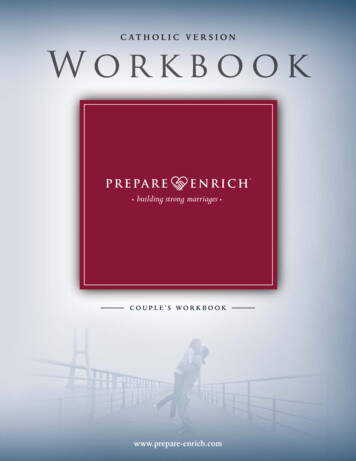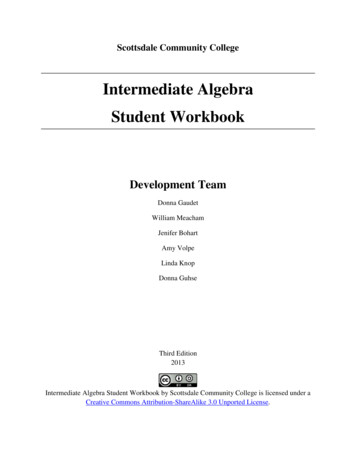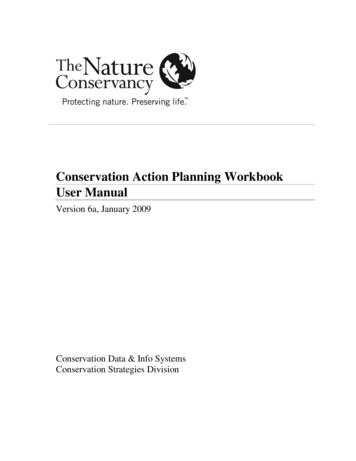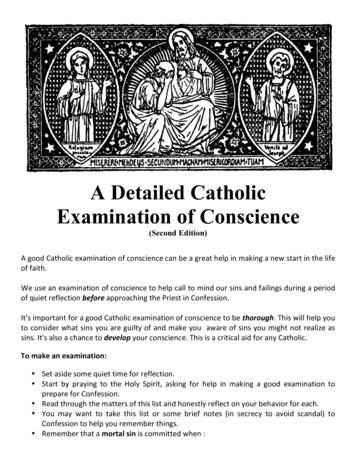
Transcription
C AT H O L I C V E R S I O N C O U P L E ’S WO R K B O O Kwww.prepare-enrich.com
Welcome to the PREPARE/ENRICH ProgramCongratulations! You have taken an important step in building a strong marriage by joining over 3million other couples who have benefited from PREPARE-ENRICH. Over the last three decades, thisprogram has been scientifically improved and updated. Research studies have demonstrated it can improveyour relationship skills and happiness as a couple.We hope you will find encouragement and insight from the exercieses and teachings we have included herefor your study.Remember to keep your relationship a priority by seeking out opportunities to help it grow. If, however,you find you have ongoing problems that don’t go away over time, consider professional counseling.Contact your current facilitator for more information or go to our website (www.prepare-enrich.com)and click on ‘contact us’.Get your Couple Checkup on your Wedding AnniversaryOne of the best ways to maintain a healthy and happy relationship is to invest time and energy in it.We highly recommend you take the online Couple Checkup once a year. You can access the assessment atwww.CatholicCoupleCheckup.com. The Checkup is built on the foundation of the PREPAREENRICH assessment you recently completed. It will provide you with an in-depth Couple’s Report andDiscussion Guide to help you figure out how your relationship has changed over the last year. You willalso get access to several relationship-enhancing exercises to that will keep your relationship on a healthypath.Checkup BooksBuild more strengths in your marriage. You’ll find evenmore couple exercises and relationship skills so you canwork together to create a more satisfying relationship. Youcan order these books online (www.prepare-enrich.com) orcall 800-331-1661.Scripture quotations are taken from The Ignatius Catholic Study Bible (revised standard version)The new Testament and The Holy Bible (revised standard Catholic Edition)
COUPLE’S WORKBOOKTABLE OF CONTENTSCATHOLIC VIEW OF MARRIAGE . . . . . . . . . . . . . . . . . . . . . . . . . . . 2/3*SHARING STRENGTH AND GROWTH AREAS . . . . . . . . . . . . . . . . . . . . . . 4COMMUNICATION: Assertiveness and Active Listening . . . . . . . . . . . . . . . . . . . 5Creating a Wish List using Assertiveness and Active Listening*DailyDialogue and Daily Compliments . . . . . . . . . . . . . . . . . . . 6. . . . . . . . 7What the Catholic Faith Says about Communication . . . . . . . . . . . . . 8PERSONAL STRESS PROFILE:Identifying Most Critical Issues .*Balancingyour Priorities . . . . . . . . . . . .Wedding Stress . . . . . . . . . . . . . .What the Catholic Faith Says about Stress. 9101112. . . . . . . . . . . . . . . . . . . . .Seeking and Granting Forgiveness . . . . . . . . . . .What the Catholic Faith Says about Conflict NFLICT RESOLUTION:Ten Steps for Resolving Conflict .* Howto take a Time-Out . . . . .FINANCIAL MANAGEMENT:The Challenges of Money. . . . . . . . . . . . . . . .Importance of Financial Goals . . . . . . . . . . . . .Budget Worksheet . . . . . . . . . . . . . . . . . . . .The Meaning of Money . . . . . . . . . . . . . . . . .What the Catholic Faith Says about Money . . . . . .LEISURE ACTIVITIES: The Dating Exercise . . . . . . . . . . . . .SEX AND AFFECTION: The Expression of Intimacy . . . . . . . .What the Catholic Faith Says about Sexuality . . . . . .RELATIONSHIP ROLES: Sharing Roles . . . . . . . . . . . . . . .What the Catholic Faith Says about Relationship/RolesSPIRITUAL BELIEFS: Your Spiritual Journey . . . . . . . . . . . . .What the Catholic Faith Says about Spiritual Beliefs . .MARRIAGE EXPECTATIONS: Managing Your Expectations . . . . .What the Catholic Faith Says about Marriage . . . . .CHILDREN AND PARENTING:Couple Discussion about Children . . . . . . . . . . . . . . . . . . . . . 31StepFamilies: Choosing Realistic Expectations . . . . . . . . . . . . . . . 32What the Catholic Faith Says about Parenting . . . . . . . . . . . . . . . 33FAMILY MAPS:* COUPLE ANDMappingYour Relationship . . . . . . . . . . . .Closeness Exercises . . . . . . . . . . . . . . . . .Flexibility Exercises . . . . . . . . . . . . . . . . .What the Catholic Faith Says about Family/Friends: SCOPE Out Your Personality . . . . . . . . . .* PERSONALITYWhat the Catholic Faith Says about Personality . .GOALS: Achieving Your Goals.Together . . . . . . . . . . . . .* SIX CORE EXERCISES.34/35. . 36. . 37. . 38. . 39. . 40. . 41
CATHOLIC VIEW OF MARRIAGEFrom www.ForYourMarriage.orgMarriage ReadinessHaving a successful marriage means more than FINDING the right person. It means BEING the rightperson. Sometimes, the FINDING part is easier. . .BEING the right person can be tougher. Are you easy to live with, generous, flexible, and willing to putyour beloved’s needs before your own? Above all, are both of you mature?Maturity means knowing who you are: Your talents Your weaknesses Your interests The things you hate to do The values that you will not compromise The preferences that you are willing to bend on What you want out of life and marriageOut of this self- knowledge comes the possibility of giving oneself freely to your beloved.Catholic BeliefsCatholics believe that marriage comes as a gift from the hand of God. The Catholic vision of marriage isrooted in Sacred Scripture and is expressed in the teachings and practices of the Church. It has these mainelements: Marriage unites a couple in faithful and mutual love Marriage opens a couple to giving life Marriage is a way to respond to God’s call to holiness Marriage calls the couple to be a sign of Christ’s love in the worldBiblical Roots of MarriageOld TestamentAccording to Sacred Scripture, God instituted marriage as the pinnacle of creation. On the sixth day, inthe first creation story, the Book of Genesis tells us: “God created man in his image; in the divine image hecreated him; male and female he created them. God blessed them, saying: ‘Be fertile and multiply, fill theearth and subdue it’” (Genesis 1: 27-28).In the second creation story, God says that “it is not good for man to be alone. I will make a suitablepartner for him.” (Genesis 2:18). This suitable helpmate was formed from the very rib of man and thuswoman was “flesh of his flesh” (Genesis 2:22-23).Woman, then, is man’s equal in dignity and the one closest to his heart. Because man and woman werecreated for one another, “a man leaves his father and mother and clings to his wife, and the two of thembecome one flesh” (Genesis 2: 24). Scripture teaches that marriage is not a mere human institution, butsomething God established from the foundation of the world.Sin not only brought about a break with God, but it also ruptured the original communion between manand woman. Adam and Eve blamed each another for what had happened and were now embarrassed bytheir nakedness (Genesis 3:7-13). The Old Testament shows how sin affected the goodness of marriage 2www.prepare-enrich.com Copyright 2012 USCCB
CATHOLIC VIEW OF MARRIAGENew TestamentChristians are new creations in Christ, healed of sin and its effects. Marriage is also recreated and madenew in Christ. Jesus tells us that in the Kingdom of God the permanent union of husband and wife thatGod originally intended can once more be realized (see Matthew 19:6-11). By the grace of the HolySpirit, husbands and wives can now truly love and honor one another. St. Paul tells us that marriage bearswitness to the indissoluble love of Christ for his Church. Thus, husbands should love their wives, “even asChrist loved the church and handed himself over for her to sanctify her” (Ephesians 5:25-26). Wives, too,are called to love their husbands as the Church loves Christ (see Ephesians 5:22-23) Because marriage is placed within the saving mystery of Jesus Christ, Catholics recognize it as asacrament. It is a means through which husbands and wives grow in love for one another and for theirchildren, become holy and obtain eternal life.For further reading: Catechism of the Catholic Church, #1602-1617Meaning and Purpose of MarriageMarriage is the intimate union and equal partnership of a man and a woman. It comes to us from thehand of God, who created male and female in his image, so that they might become one body and mightbe fertile and multiply (See Genesis chapters 1 and 2). Though man and woman are equal as God’schildren, they are created with important differences that allow them to give themselves and to receivethe other as a gift.Marriage is both a natural institution and a sacred union because it is rooted in the divine plan ofcreation. In addition, the Catholic Church teaches that the valid marriage between two baptizedChristians is also a sacrament – a saving reality and a symbol of Christ’s love for his church (SeeEphesians 5:25-33). In every marriage the spouses make a contract with each other. In a sacramentalmarriage the couple also enters into a covenant in which their love is sealed and strengthened by God’slove.The free consent of the spouses makes a marriage. From this consent and from the sexual consummationof marriage a special bond arises between husband and wife. This bond is lifelong and exclusive. Themarriage bond has been established by God and so it cannot be dissolved Permanency, exclusivity, and faithfulness are essential to marriage because they foster and protect the twoequal purposes of marriage. These two purposes are growth in mutual love between the spouses (unitive)and the generation and education of children (procreative) The family arises from marriage. Parents, children, and family members form what is called a domesticchurch or church of the home. This is the primary unit of the Church – the place where the Church livesin the daily love, care, hospitality, sacrifice, forgiveness, prayer and faith of ordinary families.For further reading: Catechism of the Catholic Church, #1601-1666From www.ForYourMarriage.org, an initiative of the United States Conference of Catholic Bishops.www.prepare-enrich.com Copyright 2012 USCCB3
SHARING STRENGTH AND GROWTH AREASBut theHolySpiritis produceskindof fruitkindness,in our lives:love, joy,peace, patience,kindness,goodness,But the22fruitof theSpiritlove, joy, s,self-control 23—GandALATIANS5:22-23faithfulness, gentleness,self-control. . . — GALATIANS 5:22-23Check what areas you agree or disagree most with your partner. Select three Strength Areas (most agreement and positive aspects of your relationship) Select three Growth Areas (most disagreement and areas you want to improve)STRENGTHAREASGROWTHAREAS1. COMMUNICATIONWe share feelings and understand each other.2. CONFLICT RESOLUTIONWe are able to discuss and resolve differences.3. PARTNER STYLE AND HABITSWe appreciate each other’s personality and habits.4. FINANCIAL MANAGEMENTWe agree on budget and Ànancial matters.5. LEISURE ACTIVITIESWe have a good balance of activities together and apart.6. SEXUALITY AND AFFECTIONWe are comfortable discussing sexual issues and affection.7. FAMILY AND FRIENDSWe feel good about our relationships with relatives and friends.8. RELATIONSHIP ROLESWe agree on how to share decision-making and responsibilities.9. CHILDREN AND PARENTINGWe agree on issues related to having and raising children.10. SPIRITUAL BELIEFSWe hold similar religious values and beliefs.COUPLE DISCUSSION:1. Take turns sharing what each of you perceive as your relationship strengths. Verbally share onestrength at a time, until you each have shared three.2. Use the same procedure to share and discuss growth areas.3. Now have a discussion around these questions:a. Did any of your partner’s responses surprise you?b. In what areas did you mostly agree with your partner?c. In what areas did you mostly disagree with your partner?4www.prepare-enrich.com Copyright 2012 Life Innovations, Inc.
COMMUNICATIONKnowUnderstandthis, my belovedbrethren.Let everybe quickto hear,to tospeak,this, mydear brothersandmansisters:You mustall beslowquicklisten,slow to anger AMES1:19–Jslow to speak, and slow to get angry. — JAMES 1:19ASSERTIVENESS AND ACTIVE LISTENINGASSERTIVENESS:Assertiveness is the ability to express your feelings and ask for what you want in the relationship.Assertiveness is a valuable communication skill. In successful couples, both individuals tend to be quiteassertive. Rather than assuming their partner can read their minds, they share how they feel and askclearly and directly for what they want.Assertive individuals take responsibility for their messages by using “I” statements. They avoid statementsbeginning with “you.” In making constructive requests, they are positive and respectful in their communication.They use polite phrases such as “please” and “thank you”.Examples of Assertive Statements:“I’m feeling out of balance. While I love spending time with you, I also want to spend time with myfriends. I would like us to Ànd some time to talk about this.”“I want to take a ski vacation next winter, but I know you like to go to the beach. I’m feeling confusedabout what choice we should make.”ACTIVE LISTENING:Active listening is the ability to let your partner know you understand them by restating their message.Good communication depends on you carefully listening to another person. Active listening involveslistening attentively without interruption and then restating what was heard. Acknowledge content ANDthe feelings of the speaker. The active listening process lets the sender know whether or not the messagethey sent was clearly understood by having the listener restate what they heard.Examples of Active Listening:“I heard you say you are feeling ‘out of balance’, and enjoy the time we spend together but thatyou also need more time to be with your friends. You want to plan a time to talk about this.”“If I understand what you said, you are concerned because you want to go skiing next winter.But you think I would rather to go to the beach. Is that correct?”When each person knows what the other person feels and wants (assertiveness) andwhen each knows they have been heard and understood (active listening), intimacy isincreased. These two communication skills can help you grow closer as a couple.www.prepare-enrich.com Copyright 2012 Life Innovations, Inc.5
COMMUNICATIONLet the words of my mouthmeditationmy heartbe acceptablemytorockMayandthethewordsof my ofmouthand ou,and my redeemer.— PandSALMO LORD, my rockmy19:14redeemer. — PSALM 19:14CREATING A WISH LISTIn this exercise, you will each individually make a Wish List of things you would like more or less of inyour relationship. Next, take turns sharing your Wish Lists with each other.Assertiveness is the ability to express your feelings and ask for what you want in your relationship.Active listening is the ability to let your partner know you understand them by restating their message.In sharing your Wish List with your partner, you will be demonstrating your Assertiveness skills. In givingfeedback to your partner about their Wish List, you will be demonstrating your Active Listening skills. Make a Wish List of three things you would like more or less of in your relationship.1.2.3.COUPLE DISCUSSION:Take turns sharing your Wish List with each other.SPEAKER’S JOB:1. Speak for yourself (“I” statements e.g. ”I wish.”).2. Describe how you would feel if your wish came true.LISTENER’S JOB:1. Repeat/summarize what you have heard.2. Describe the wish AND how your partner would feel if the wish came true.After completing the Wish List Exercise, discuss the following questions:How good were each of you at being assertive?In what ways did you each effectively use active listening skills?6www.prepare-enrich.com Copyright 2012 Life Innovations, Inc.
COMMUNICATIONThere is one whose rash words are like sword thrusts, but the tongue of the wise brings healing. – PROVERBS 12:18DAILY DIALOGUE AND DAILY COMPLIMENTSDaily Dialogue is an intentional effort to talk about your relationship, rather than discussing youractivities that day. The focus of this dialogue should be on your feelings about each other and your livestogether. Set aside five minutes per day to discuss the following: What did you most enjoy about your relationship today? What was dissatisfying about your relationship today? How can you be helpful to each other?Daily Compliments help you focus on the positive things you like about each other. Every day give yourpartner at least one genuine compliment. These can be general (“you are fun to be with”) or specific(“I appreciate that you were on time for the concert”). COMMUNICATION SKILLS TO INCREASE INTIMACY 1. Give full attention to your partner when talking. Turn off the phone, shutoff the television, make eye contact.2. Focus on the good qualities in each other and often praise each other.3. Be assertive. Share your thoughts, feelings, and needs.A good way to be assertive without being critical is to use “I” rather than “You”statements. (i.e. “I worry when you don’t let me know you’ll be late” rather than “You arealways late”).4. Avoid criticism.5. If you must criticize, balance it with at least one positive comment.(i.e.“I appreciate how you take the trash out each week. In the future can you remember toalso wheel the trash can back from the end of the driveway?” ) .6. Listen to understand, not to judge.7. Use active listening. Summarize your partner’s comments before sharing yourown reactions or feelings.8. Avoid blaming each other and work together for a solution.9. Use the Ten Steps approach. For problems that come up again and again, usethe Ten Steps for Resolving Couple Conflict. (see p. 11).10. Seek counseling. If you are not able to resolve issues, seek counseling beforethey become more serious.www.prepare-enrich.com Copyright 2012 Life Innovations, Inc.7
WHATWHATTHE THECATHOLICBIBLE SAYSFAITHABOUTSAYS ABOUTCOMMUNICATIONCOMMUNICATIONCCC#2477 Respect for the reputation of persons forbids every attitude and word likely to cause them unjustinjury.278 He becomes guilty: of rash judgment who, even tacitly, assumes as true, without sufficient foundation, the moral fault of aneighbor; of detraction who, without objectively valid reason, discloses another’s faults and failings to personswho did not know them; 279 of calumny who, by remarks contrary to the truth, harms the reputation of others and gives occasionfor false judgments concerning them.CCC#2489 Charity and respect for the truth should dictate the response to every request for informationor communication. The good and safety of others, respect for privacy, and the common good are sufficientreasons for being silent about what ought not be known or for making use of a discreet language. The dutyto avoid scandal often commands strict discretion. No one is bound to reveal the truth to someone whodoes not have the right to know it.283PSALM 19:14 Let the words of my mouth and the meditation of my heart be acceptable in thy sight, OLORD, my rock and my redeemer.PROVERBS 18:13 If one gives answer before he hears, it is his folly and shame.278 Cf. CIC, Can.220279 Cf. Sir 21:28283 Cf. 27:16, Prov 25:9-108www.prepare-enrich.com Copyright 2012 Life Innovations, Inc.
PERSONAL STRESS PROFILE28and areI willandgiveI willyou rest.Then Jesus said, “ComeCometo me,toallme,of allyouwhowholaborare wearyandheavycarryladen,heavyandburdens,give you rest. 29 Take my yokeTake myyokeuponand you,learnbecausefrom me;forhumbleI am gentleand lowlyin heart,andwillyouÀwillfindforrestforsouls.your souls.uponyou.Let you,me teachI amand gentleat heart,and yound restyour–M11:28-29—MATTHEWATTHEW 11:28-29IDENTIFYING MOST CRITICAL ISSUESDo you control stress in your life or does stress control you?Stressors are events that cause an emotional and/or physical reaction. Stress can be positive (wedding,job promotion) or negative (loss of job, car accident, major illness). But what is important is to be ableto manage the many stressors in your life.One way to manage stress is to prioritize the issues that are most important to you. Another is to decidewhat issues can be changed or resolved and which ones cannot. This exercise will help you focus on thehigh priority issues and those that can be changed (Box 1).Couple Exercise:1. You will each select four issues that are the most stressful for each of you from the Computer Report.2. Review each issue and put it into one of the four cells below.3. Box 1 contains the “Most Critical Issues.”Able to ChangeDifÀcult to ChangeBox 1: Most Critical IssuesBox 2What changes can you each make?Box 3How do you plan to cope?Box 4: Least Critical IssuesAre you spending too much timeon low priority issues?Can you accept or forget about these issues?HighPriorityLowPriorityCOUPLE DISCUSSION:Select one issue from Box 1 that you will work on together as a couple.Work together as a team to achieve your goals.1. Communicate about the issue.2. Use good conÁict resolution skills.3. Be Áexible with one another.www.prepare-enrich.com Copyright 2012 Life Innovations, Inc.9
PERSONAL STRESS PROFILEMy flesh and my heart may fail, but God is the strength of my heart and my portion forever.—PSALM 73.6BALANCING YOUR PRIORITIESFirst, indicate how much time you “Now” spend on each of these areas. Next, decide on the amount of timeyou would ideally spend—”Your Goal”. Then decide how you can achieve your goal.WORKTime on job/schoolBringing work homeCommutingNOWYOUR GOAL(Hours per week)PERSONAL:ExerciseTelevisionComputer/video gamesHobby/RecreationReadingFriendsReligious activitiesVolunteeringSleep (hours per night)MARRIAGE: (Couple)Time togetherActivities/DatesDiscussions (minutes per day)HOME:CleaningCookingGrocery shoppingErrandsLawn/GardenHome maintenanceFAMILY: (if children at home)Number of meals togetherFamily activitiesTransporting childrenHelping with homeworkAt home togetherCOUPLE DISCUSSION: What areas feel out of balance to each of you? What steps must you take in order for your goal to become reality?10www.prepare-enrich.com Copyright 2012 Life Innovations, Inc.How will you movetoward your goal?
PERSONAL STRESS PROFILEWEDDING STRESSDifferences and disagreements are as inevitable in wedding planning as they are in marriage itself. Thisis a good time to learn how to deal with them. Here are some strategies you might Ànd helpful:1. Consider the big picture as it affects each decision. Some decisions will be made consequentially as other wishesare discussed. For example, the guest list should be created early because it shapes decisions about facilities andcosts, among other things. If one of you wants a tropical beach wedding and the other a hometown wedding,you can discuss these options in the light of other issues such as the fact both of you want your frail grandparents to come to your wedding. Seeing the larger picture can help you resolve differences.2. Ask yourselves who cares more about the issue. You can decide to gracefully adjust your preference if your partner has strong feelings about an issue. You may prefer a small, intimate wedding but your partner hascherished the family tradition of a large wedding. Try setting a number that gives more to the person whocares the most.3. Periodically assess your wedding-planning stress and feelings of competency. If your partner has not followedthrough on a task they were responsible for, or if you feel better equipped for a particular task, politely offerto help or take over (e.g., “I am interested in photography and have a light work schedule next week. Is it okay if I researcha photographer?” ). The key is to agree together on a shift of responsibility, rather than saying, “Since you won’t doit, I will!” The person who has been relieved of one responsibility should then offer to help with other responsibilities.4. Teach and learn from one another rather than assuming the other “gets it.” Sometimes one of you will notsee a problem that is quite clear to the other. You can both educate each other about your families and theirtraditions. The groom from a Catholic family should explain to his Protestant bride what is involved in atraditional Catholic wedding, rather than having surprises keep coming up.5. When you are doing your best to deal with your differences and yet remain polarized, consider whether deeper issuesare underlying your conÁict. For example, sometimes the issue is not about the size of the weddingbut about a feeling of envy or competition because one of you has a bigger family or circle of friends.Sometimes the issue is not between the two of you, but between one of you and your family members.The standard tools of effective communication taught in PREPARE/ENRICH are particularly important whenthere is tension between you. Examples are speaking for yourself using “I-statements” rather than attacking theother person, listening to understand before proposing solutions, and choosing the best time and place to talkabout difÀcult matters. Your everyday communication patterns might be Àne for everyday matters, but whenyou are negotiating a wedding, it’s good to be at your best!From Take Back Your Wedding: Managing the People Stress of Wedding Planning, by William J. Dohertyand Elizabeth Doherty Thomas (2007). For more information and resources to deal with yourwedding, visit www.TheFirstDance.comwww.prepare-enrich.com Copyright 2012 Life Innovations, Inc.11
WHATWHATTHETHEBIBLECATHOLICSAYS ABOUTFAITH SAYSPERSONALABOUTSTRESSSTRESSCCC#301 With creation, God does not abandon his creatures to themselves. He not only gives thembeing and existence, but also, and at every moment, upholds and sustains them in being, enables them toact and brings them to their final end. Recognizing this utter dependence with respect to the Creator is asource of wisdom and freedom, of joy and confidence.CCC#2828 “Give us”: The trust of children who look to their Father for everything is beautiful. “He makeshis sun rise on the evil and on the good, and sends rain on the just and on the unjust.”113 He gives to allthe living “their food in due season.”114 Jesus teaches us this petition, because it glorifies our Father byacknowledging how good he is, beyond all goodness.“Accept the duties which come upon you quietly, and try to fulfill them methodically, one after another.If you attempt to do everything at once, or with confusion, you will probably be overwhelmed andaccomplish nothing. In all your affairs lean solely on God’s Providence, by means of which your plans cansucceed.” – St. Francis De SalesPSALM 73:26 My flesh and my heart may fail, but God is the strength of my heart and my portionforever.DEUTERONOMY 31:8 It is the LORD who goes before you; he will be with you, he will not fail you orforsake you; do not fear or be dismayed.”PHILIPPIANS 4:6-7 Have no anxiety about anything, but in everything by prayer and supplicationwith thanksgiving let your requests be made known to God. 7 And the peace of God, which passes allunderstanding, will keep your hearts and your minds in Christ Jesus.1 PETER 5:7 Cast all your anxieties on him, for he cares about you.113 Mt 5:45114 Ps 104:2712www.prepare-enrich.com Copyright 2012 Life Innovations, Inc.
CONFLICT RESOLUTIONTEN STEPS FOR RESOLVING CONFLICTAll couples have differences and disagreements. Studies show the amount of disagreements are not relatedto marital happiness as much as how they are handled. Happy couples do not avoid disagreements; theyresolve them while remaining respectful of each other, thereby strengthening their relationship. This TenStep Model is a simple, but effective way to resolve conflict while avoiding the common and destructivepatterns. Use this model with an ongoing issue in your relationship, as well as future issues.1. Set a time and place for discussion.2. Define the problem - Be specific.3. List the ways you each contribute to the problem?Partner 1:Partner 2:4. List past attempts to resolve the issue that were not successful.1)3)2)4)5. Brainstorm—Pool your new ideas and try to list 10 possible solutions to the problem. Do not judgeor criticize any of the suggestions at this point.1)6)2)7)3)8)4)9)5)10)6. Discuss and evaluate each of these possible solutions. (Be as objective as possible. Talk about howuseful and appropriate each suggestion feels for resolving your issue.)7. Agree on one solution to try.8. Agree how you will each work toward this solution. (Be as specific as possible.)Partner 1:Partner 2:9. Set up another meeting to discuss your progress.Place:Date:Time:10. Reward each other for progress. (If you notice your partner making a positive contribution towardthe solution, praise his/her effort.)www.prepare-enrich.com Copyright 2012 Life Innovations, Inc.13
CONFLICT RESOLUTIONSo encourageeach encourageother and onebuildanothereach otherjustoneas anotheryou are alreadyTHESSALONIANS 5:11Thereforeand up,buildup, just doing.as you—are1doing.—I THESSALONIANS 5:11HOW TO TAKE A TIME-OUTSome conÁicts become heated as levels of anger and frustration rise. Rather than speaking assertively, partners begin to accuse, criticize, or yell. Rather than listening actively, partners interrupt, belittle, and ignore.Physiologically, the “Àght or Áight” response is triggered as each person goes into a protection mode withlittle or no regard for their partner. In this state of escalation, it is not uncommon to say or do things welater regret. Moreover, it is nearly impossible to have a productive conversation leading to a mutually agreedupon resolution. This is when a “time-out
The free consent of the spouses makes a marriage. From this consent and from the sexual consummation of marriage a special bond arises between husband and wife. This bond is lifelong and exclusive. The marriage bond h











